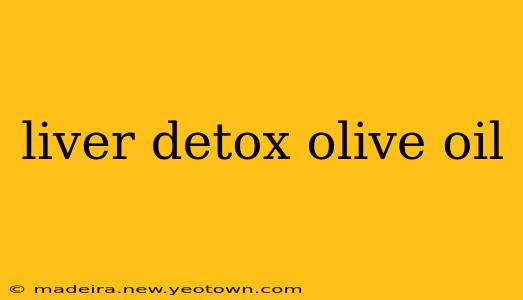The Liver's Secret Ally: Exploring the Olive Oil Detox
Our livers, unsung heroes of our internal landscape, work tirelessly filtering toxins, metabolizing nutrients, and keeping us functioning smoothly. But with the onslaught of modern life – processed foods, environmental pollutants, and stress – even the most robust livers can feel the strain. That's where the age-old remedy of an olive oil liver detox enters the picture. But is it truly effective? And how does it work? Let's delve into this intriguing and often-debated topic.
This isn't about a quick fix; it's about supporting your liver's natural detoxification processes. Olive oil, with its rich antioxidant and anti-inflammatory properties, can play a supportive role in this journey. Think of it as a gentle nudge, not a forceful cleanse.
What is a Liver Detox with Olive Oil?
A liver detox using olive oil isn't a medically recognized procedure. It's more accurately described as a dietary approach aiming to aid liver function. It often involves incorporating extra virgin olive oil into your diet alongside other practices designed to promote overall well-being. The idea is that the antioxidants and healthy fats in olive oil can help protect liver cells from damage and enhance their ability to process toxins.
Does Olive Oil Cleanse the Liver?
The idea that olive oil “cleanses” the liver is a bit of a simplification. Your liver has its own remarkable system for detoxification, constantly working to filter and eliminate waste products. Olive oil doesn't "cleanse" in the literal sense of scrubbing away substances, but rather supports the liver's natural ability to do its job more effectively. It's a matter of support, not replacement.
What are the Benefits of Olive Oil for Liver Health?
Olive oil's benefits for liver health stem primarily from its rich composition:
- Antioxidants: Olive oil is brimming with antioxidants, compounds that combat free radicals – unstable molecules that can damage cells, including liver cells.
- Anti-inflammatory Properties: Chronic inflammation can contribute to liver damage. Olive oil's anti-inflammatory effects can help mitigate this risk.
- Healthy Fats: Olive oil provides monounsaturated fats, beneficial for overall health and potentially helpful in improving liver function.
How Do I Use Olive Oil for Liver Support?
There’s no single, prescribed method. The best way to incorporate olive oil for liver support is as part of a balanced diet. Think of it as a healthy swap – replacing less healthy fats with extra virgin olive oil in your cooking and dressings.
A tablespoon or two daily, incorporated into your meals, can contribute to your overall intake of healthy fats and antioxidants. Always choose extra virgin olive oil, as it retains the highest concentration of beneficial compounds.
Are There Any Side Effects of Using Olive Oil for Liver Support?
Generally, olive oil is well-tolerated. However, consuming excessive amounts can lead to digestive upset, such as diarrhea or stomach cramps. If you have any pre-existing gallbladder issues, it's crucial to consult a healthcare professional before significantly increasing your olive oil intake.
What Other Things Can I Do to Support My Liver Health?
While olive oil can be a helpful addition, supporting your liver health is a holistic endeavor. Here are other key strategies:
- Maintain a Healthy Weight: Obesity puts extra strain on the liver.
- Eat a Balanced Diet: Focus on fruits, vegetables, lean proteins, and whole grains.
- Limit Alcohol Consumption: Excessive alcohol consumption is a leading cause of liver damage.
- Manage Stress: Chronic stress can negatively impact liver function.
- Regular Exercise: Physical activity promotes overall health and supports liver function.
Disclaimer: This information is for educational purposes only and should not be considered medical advice. Always consult with a healthcare professional before making any significant dietary changes, especially if you have pre-existing health conditions. They can help you determine the best approach for your individual needs and health status.

